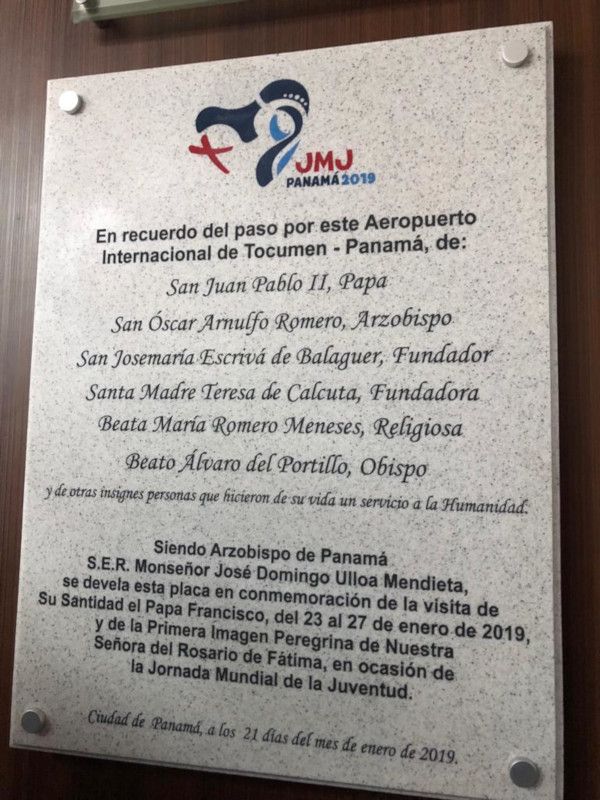30 January (Panama)
On the 30th, late in the evening, the Prelate returned to Panama after spending a day in Nicaragua. In his homily at Mass the next morning, he made reference to the day’s Gospel reading and encouraged those present to be light, salt and leaven wherever they are.
After Mass, Lesbia gave the Prelate a rosary she made herself, using seeds for the beads. She said she had made a number of them to sell to those attending WYD, to raise money for scholarships for the Hospitality School where she works.
Before leaving for the airport to catch his flight to Puerto Rico, the Prelate said to those accompanying him that he wouldn’t say good-bye, since in Opus Dei and the Church we are always united by the communion of saints.
30 January (Nicaragua)
The Prelate arrived in Nicaragua early in the morning, for two catechetical get-togethers in Managua, in La Rivera and Villa Fontana cultural centers.
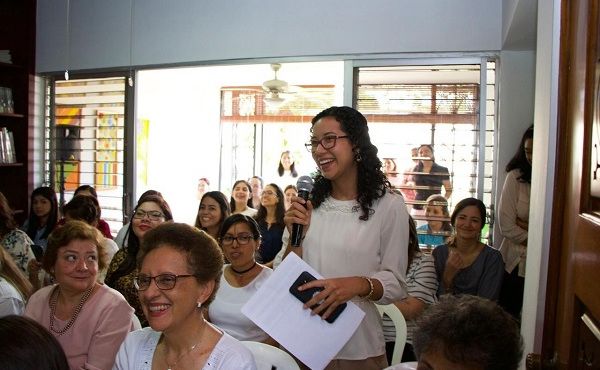
In the get-together with women faithful and cooperators of Opus Dei, he stressed that “our faith and love for God should fill us with security, hope and joy, and that when suffering comes—small or big setbacks—we should unite ourselves to Christ’s Cross. Any situation, when offered to our Lord, is taken on by Jesus as his own and He gives it immense value.”
Yelba told him that 19 years ago she began with other friends an educational center in Diriamba. The Prelate encouraged her to continue offering human and Christian formation to many women, “because everything that is done for God is effective. He takes into account our difficulties and the fruit often comes without our realizing it.”
Jenny, one of the young women studying in that center, said that she was helped to discover God there, since she wasn’t practicing any religion at the time. On 26 May 2018, when Nicaragua was undergoing a serious crisis, she was baptized, and her life was filled with a new hope.
Marcela, married with two young children, asked how a mother like her with so much to do each day could discover her vocation. “Certainly it’s possible. God is the one who gives a vocation and for Him nothing is impossible. As Saint Josemaria used to say, God is especially interested in people who have a lot to do and don’t have time, since they are dedicated people who give themselves to others.”
Sandra asked him to pray for unity and peace in Nicaragua. The Prelate assured her that he prays each day for this country, so that the people come closer to God and desire peace.
Cindy, an industrial engineer, spoke about her vocation to celibacy in Opus Dei. When she discovered this divine call, she was afraid that her parents wouldn’t understand it, since they aren’t Catholics. “But I trusted that God would help me.” The Prelate remarked that God takes our freedom into account when calling us, “but He also helps us with his grace; at times we have to trust more in God.”
In the second get-together, Monsignor Fernando Ocáriz invited the people there “to never lose their joy and hope. Saint Josemaria used to say that to be happy what we need is not a comfortable life, but a heart in love. A heart in love is the source of hope.”
On seeing the broad horizons for the work of evangelization required in Nicaragua, he said that “it might seem that we are few for so much that needs to be done. But God’s strength is greater. May all the work that needs to be done and all the peace that needs to be sown lead you to pray more, to forgive more.”
In this regard, Humberto asked the Prelate how to forgive others when it is difficult to do so. “By having the same sentiments as Christ Jesus for other people. In times that were also difficult, Saint Josemaria prayed: ‘May I see with your eyes, my Christ.’ You can always find the strength you need to forgive in the Eucharist.”
29 January 2019
The Prelate had a get together with university students and young professionals at the Miravalles University Center in San José. Monsignor Ocáriz suggested to those present to “give thanks to God for the Christian formation you receive, knowing that our formation never ends. The goal of this formation is to identify ourselves with Christ and we should receive it with an active attitude, so that we can come to have the same sentiments as Christ.”
And when we do not live like Christ, “we should always have recourse to confession, which can lift us up. Strength comes from the Blood of Christ, and that’s why it’s important to want to be Eucharistic souls.”
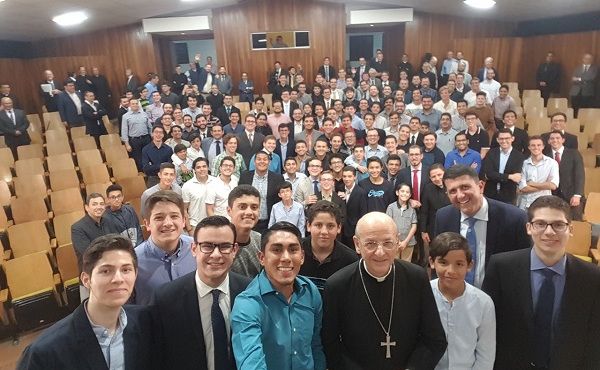
The Prelate reminded them to keep praying for Pope Francis. “Pray also for those who are suffering hardships all over the world. This reality should lead us to treat others better and to live fraternity well, in our own family and with our friends.”
Isaac asked the first question. He is studying veterinary medicine and works on a farm. How can we help people to discover the beauty of the virtue of purity? “Sex is not something dark,” the Prelate replied. “But since it is such a great and noble reality, its corruption is even worse. If instead, we struggle to live this gift in an ordered way, we are filled with joy, and are able to be concerned about others. We all have to struggle, without getting discouraged. It will be like that right to the end of our life.”
José Luis is from Venezuela and is studying in Costa Rica. “I want with all my strength to return to my country and help my people.” The Prelate told him to pray a lot for Venezuela so that the hardships and violence are overcome.
Juan Félix told him that he is Juan Felix III and that he, his father, and grandfather are all supernumeraries. He himself requested admission recently and he asked how to keep his enthusiasm for his vocation alive. “We all have a vocation. Our Lord is concerned about everyone. God has a plan for everyone. It doesn’t depend on enthusiasm; we shouldn't confuse sureness in our vocation with enthusiasm. It is the response to God’s call.”
Fernando Quesada, 21 years old, is a student in Industrial Engineering and asked about how to make respect for creation part of our path of holiness. “Holiness has to do with everything because we can find God in anything and any activity. Respect and care for creation means both not cutting down a forest when it should be avoided and also cutting it down when it should be done, if that entails a good for human beings. Everything depends on doing things in a rightly ordered way.”
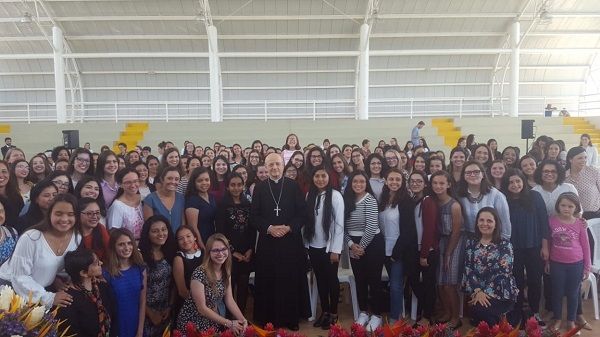
Monsignor Ocáriz also met with some women who attend the activities of formation offered by Opus Dei. The Prelate spoke to them about the importance of "facing all the situations in our life, joys and sorrows, in the same way that Jesus would have done.”
Maripaz Villalobos, who studies preschool education, asked about the use of social media. “You can have a very positive presence there. At the same time, it requires a lot of self-control to not devote more time than is necessary to it.”
Rosa from Guatemala asked about how to trust God’s will when it is not easy to accept. “God has a plan for each one that can be difficult for us to understand, because Our Lord permits setbacks and failures. Saint Josemaria, who suffered a lot, taught us that we may cry or have trouble understanding things, but that we should not give in to sadness. If we have faith, we believe in the great love that God has for us. God wants us to be saints, which doesn’t mean being perfect. He loves us with our defects, but always struggling to be better.”
Paula Odio, a university student, said that she took part in WYD in Panama and that it impressed her to see so many young people from different parts of the world who love the Church. “This should help us,” Monsignor Ocáriz said, “to see in the others the love that God has for each one. We should try to see them with His eyes. Sometimes this can be a bit complicated, but it can be achieved by asking God for the charity we need to treat every person well.”
The Prelate also reminded them that when they are with people who don’t share our faith, we first have to love them and think that God wants to reach them through us, “not because we are better but because we have received more from God. We should pray for people who are far from Him.”
28 January 2019
Monsignor Ocáriz went to the Iribó School in San José to meet with women who participate in the means of formation offered by Opus Dei. He began by highlighting the importance of joy. “God wants us to be happy, and that our joy may be full; this is achieved by His grace and help. To be happy, we need a heart in love with God and He will give us the strength to love everyone: our family, friends and peers.”
The first question came from Marjorie who is about to celebrate 55 years of marriage; she asked about how to understand and realize that we have so much to contribute to our families. “You yourself have realized that the greatest thing that we can do is to make Christ known, get to know Him and bring Him everywhere in response to everything that He has given us, especially in our own family.”
The Prelate also responded to Jessica who is from Peru and who moved to Costa Rica for professional reasons. She asked about how to bring the light of faith to many people: “Make the most of your daily situation to get to know more people, asking the Holy Spirit for light.”
The Prelate emphasized the great value of fraternity in families, and between friends and colleagues. Gabriela, a mother of seven children, wanted to know how to live charity with her loved ones who think differently from her: “To be a friend, a spouse or a mother requires a spiritual effort. To understand those who are at our side, we should first try to see the good and positive things in them, the best side of each one. We are all worth a lot and so there is no room for distinctions; the differences we see should lead us to love and appreciate each other more.”
Claudia asked about how to not get down when trying to bring others closer to God, especially when people seem to think they don’t have time for Him. “Don’t be discouraged. Think about how difficult it was for Saint Josemaria to start the Work. At the same time, be aware of the fact that our work is never done in vain. When one works for God, everything is for His glory.”
Laura, who is married, wanted to ask two questions. The first was about how to contribute to creating a culture open to life, and the second was how to speak to young couples about persevering in their marriages.
“Abortion is the murder of an innocent person,” the Prelate said in response to the first question. "We can't let ourselves be misled by what is unfortunately the leading trend.” In regards to the second question, he said, “When a marriage breaks up quickly, it’s because there is a lack of love. Love is not the initial excitement, which is passing; love is to want the good of another person. We should teach young people what love is.”
27 January 2019
The Father arrived in San José, Costa Rica, in the afternoon. Upon arrival at the Miravalles University Center, an Opus Dei residence where he will be staying during his time in San José, he greeted some families who were waiting there to welcome him.
One of the families was from Ciudad Neilly, close to the border with Panama; another was from San Luis de Santo Domingo de Heredia and another from Curridabat, a suburb of the capital city. They were able to talk for a few minutes with the Prelate and he gave each of the families his blessing.
Later on, Monsignor Ocáriz and a group of Opus Dei greeted some university students and also a group of faithful of Opus Dei who were waiting for him in the Guaitil Academy of Gourmet Cooking, connected to Miravalles.
In one of these encounters, José Daniel told the Prelate that his girlfriend and a number of his friends had read The Way with him, and it had helped them very much. The Prelate spoke about the need to never be afraid of God and to speak to Him like a friend. “Sacred Scripture often tells us not to fear God, and to realize we are always accompanied by Him. Saint Josemaria said that a person who fears does not yet know how to love. Let us not be afraid if He asks us for more than we want to give.”
25 January 2019
The Prelate went to the Entremares University Center, a center of Opus Dei close to Our Lady La Antigua Field, where many of the the main World Youth Day events were to take place.
In Entremares the Prelate celebrated Holy Mass. In a brief homily, he made reference to the day’s feast of the Conversion of Saint Paul. He encouraged those present to ask the Apostle to the Gentiles for the conversion of each one of those taking part in the events with the Holy Father: “Not only for the conversion of those who don’t have faith but also so that each one of us takes another step closer to our Lord.”
We need to desire “a permanent conversion,” he said. “Like Saint Paul, we find ourselves constantly facing our Lord, who tells us, ‘What are you waiting for? Why do you delay?’ Let us ask our Lord to make us react.” He also asked for prayers for persecuted Christians and for those facing special difficulties.
Monsignor Ocáriz then went to the Vasco Núñez de Balboa Conventions Center, where he had his first catechetical get-together during World Youth Day. At the beginning, he spent a few minutes with a group of young people from Venezuela. The first get-together was attended by over 1,500 young women from countries as far away as the Philippines. The young people received the Prelate with a special “wave,” making reference to the two oceans (the Atlantic and the Pacific) on either side of Panama.
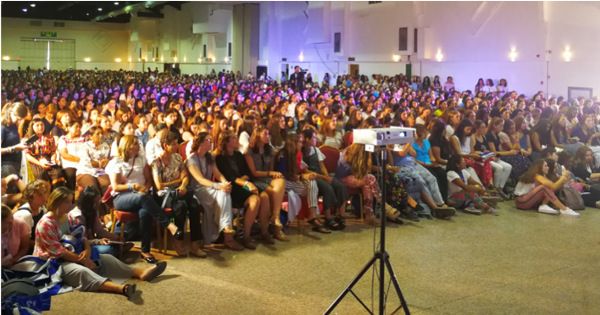 Right at the start, the Prelate asked for prayers for Pope Francis. He also spoke about joy, saying “our goal in life is to love God more each day” and that happiness awaits each one of us right where we are. Zugeilys, from Panamá, asked the first question. She was followed by María José (Colombia), Natalia (Brazil), Guadalupe (Uruguay), Sofía (El Salvador), Karin (Chile), Regina (Mexico), Tita (Guatemala) and María Gabriela (Brazil).
Right at the start, the Prelate asked for prayers for Pope Francis. He also spoke about joy, saying “our goal in life is to love God more each day” and that happiness awaits each one of us right where we are. Zugeilys, from Panamá, asked the first question. She was followed by María José (Colombia), Natalia (Brazil), Guadalupe (Uruguay), Sofía (El Salvador), Karin (Chile), Regina (Mexico), Tita (Guatemala) and María Gabriela (Brazil).
“It’s possible that we might suffer, it’s possible that we might cry, but that we be sad? No,” the Prelate said. He also spoke about the vocation that God has in mind for each person. “You need courage to want it, not only to see it. When we say ‘yes’ to the Lord, it’s because of an interior grace. We shouldn't be afraid because a vocation, any vocation, is a gift that He grants us.”
Therefore “on our part, we have to reply ‘yes, I want to.’ Then we need to seek advice, to pray and to go as frequently as possible to the Eucharist.” He also spoke about freedom: “Because to commit yourself to something, you have to do it freely. Making a commitment is a way of exercising our freedom,” he reminded them.
Finally, he mentioned the importance of friendship. “When there is true friendship, there is concern for the other person. If the person is truly a friend,” Monsignor Ocáriz said, responding to someone who asked a question, “she will be interested in your life, and you in hers. This is a starting point and, little by little, the friendship will become apostolate; and together, you will draw closer to our Lord.”
After receiving some families, the Prelate had another catechetical encounter in the afternoon. Over 900 young fellows, the majority from Central America, filled the auditorium. Upon entering the room, the Prelate stopped to speak with Gerardo, a young boy in a wheel chair who receives classes of Christian formation at a center of Opus Dei. Gerardo gave the Prelate a prayer card of Saint Oscar Romero.
In the get-together, Monsignor Ocáriz recalled how “Saint Josemaria reminded us that we can find our Lord in daily events in our lives. Holiness is within everyone’s reach: at work, doing sports, in our families… in everything.” And he added: “Sometimes we don’t understand the things that happen to us or what’s happening in the world. So it helps to have faith.”
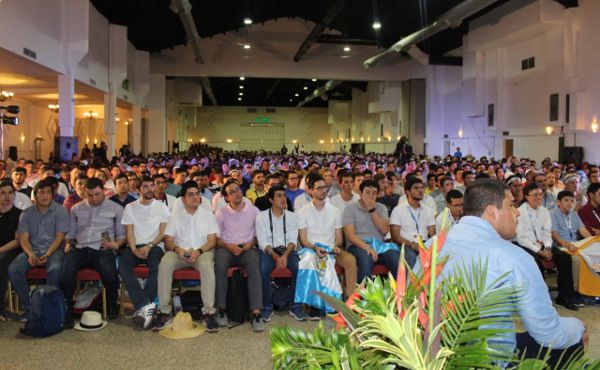
Clemente, who is 22 and came from Chile, asked the Prelate for advice for young people who are considering a vocation of apostolic celibacy. “If a person sees that this is the path that God is showing him – because of the circumstances, signs, and advice from those who know him – then he should go for it,” he responded. “We don't do God a favor with apostolic celibacy. It’s He who is giving us a gift. Remember what Jesus told the Samaritan woman: ‘If you knew the gift of God, and who it is that gives it to you…’.”
Francisco, from México, said that he was quite distant from God two years ago, and that now he lives in a center of Opus Dei. “What can we do so as to not abandon daily prayer?” he asked. The Prelate said that being faithful to our daily conversation with God can be difficult. “The catechism speaks of a ‘battle’ when it speaks about prayer. It requires effort. But even when it goes badly, it’s always worth it. There are many ways to do prayer. One is to read the Gospel, putting yourself into the scenes, interacting with our Lord in them.”
A young fellow from Nicaragua mentioned the difficulties his country is undergoing. “You shouldn't lose hope,” the Prelate responded. “Pray, because by praying we are already doing a lot. The Cross is mysterious, we don’t understand it. It’s a question of faith.”
Another young person asked what we should do when we make a wrong decision: “Nobody chooses evil because it’s bad. We are seeing something good in what is bad when we chose it.” The important thing is “to be very sincere with ourselves and realize that what makes us happy is the good: it’s love, it’s the greatest Love, which is God.”
The Prelate ended with a call to optimism: “We mustn’t get discouraged. Saint Josemaria taught us to begin and begin again. Begin again in the first place by going to where our strength lies: in confession and the Eucharist; in good friendships; in seeking advice…”
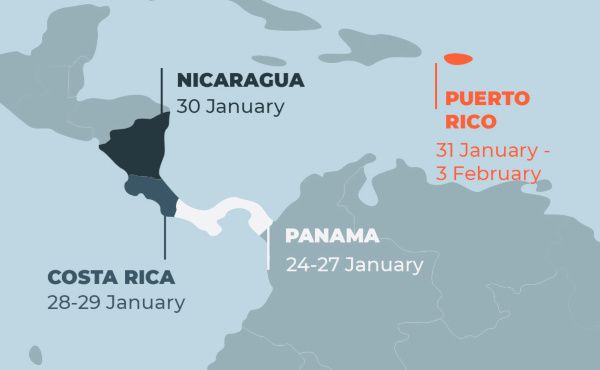
At the end, he was given as a gift a sombrero from Guatemala, World Youth Day wrist bands, and an image of our Lady.
24 January 2019
Monsignor Fernando Ocáriz landed on Thursday afternoon in the Tocumen airport in Panama. Some faithful of Opus Dei and World Youth Day volunteers accompanied him to the chapel, where a few days earlier a plaque was placed commemorating the various saints who have passed through the airport, including Saint Josemaria. The Prelate prayed before an image of the patroness of Panama, Our Lady La Antigua.
From there, Monsignor Ocáriz made his way to the Cerro Azul conference center, located in the mountains near Tocumen. Upon arrival, the Prelate greeted the faithful of Opus Dei who were waiting for him at the Tagua Training Center, a center that promotes educational initiatives for women in the area.
In Cerro Azul, the Prelate heard stories about the World Youth Day preparations, the Pope’s arrival, and the festive atmosphere among the young people in Panama during the past few days.
21 January 2019
On Monday, a special plaque was placed in the Tocumen airport to commemorate the saints and blesseds who have visited the country and passed through the airport. The Metropolitan Archbishop of Panama, José Domingo Ulloa, was on hand for the installation, which included a small ceremony.
“Now it will be remembered in our history that illustrious people have passed through this airport,” said Archbishop Ulloa.
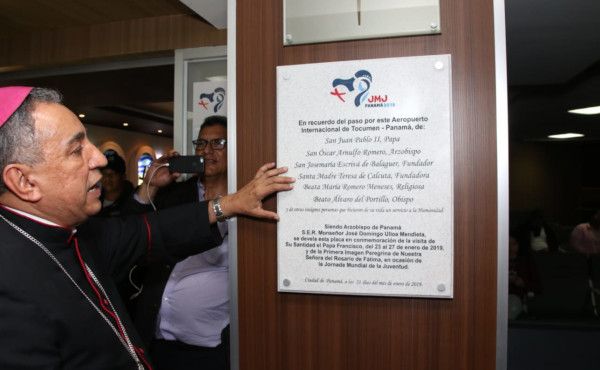
The text of the plaque reads: “In memory of the passage through this International Airport of Tocumen in Panama of Saint John Paul II, Pope; Saint Óscar Arnulfo Romero, Archbishop; Saint Josemaria Escrivá de Balaguer, Founder; Saint Mother Theresa of Calcuta, Founder; Blessed María Romero Meneses, religious sister; Blessed Álvaro del Portillo, Bishop, and other illustrious people who made their lives a service to humanity.”
At the bottom of the the plaque are the words: “Under His Emminence Monsignor José Domingo Ulloa Mendieta, Archbishop of Panama, this plaque is being unveiled to commemorate the visit of His Holiness Pope Francis from January 23 to 27, 2019, together with the first pilgrim image of Our Lady of the Rosary of Fatima, on the occasion of the World Youth Day.”Saint Josemaria passed through Panama on his way to Guatemala in 1975. He was traveling from Venezuela during a catechetical trip.
Saint Josemaria’s visit: February 1975
In February 1975, a few months before his death, Saint Josemaria traveled from Venezuela to Guatemala and the plane made a stop in Panama. The apostolic work of Opus Dei in Panama did not yet exist (it began in Panama in 1996). Blessed Alvaro del Portillo accompanied Saint Josemaria on this trip.
Bishop Javier Echevarría, the previous Prelate of Opus Dei, visited Panama in 2000. He recalled that brief stay of Saint Josemaria in Panama during a get together with Opus Dei faithful: “I unite my prayer to the prayer of Saint Josemaria 25 years ago. He was a priest whose heart was too big for his body. He wasn’t more than an hour in the airport because it was a short layover, but I can assure you that his prayer was focused on this wonderful land, thinking of those who were here then, those who had come before, and those who were yet to come.”